
Butterflies in your stomach. Summit Fever. Post-fall hissy-fits. Redpointing can be a highly stressful process, reducing even the most gregarious climber to a gibbering wreck, bringing out a dark side in the most cordial of characters or causing a grown adult to regress to the temper-tantrums of the terrible twos...
Sound familiar? You'll have encountered the highs and lows of redpointing, clipping the chains in relief and believing the mental struggles to be part of a process that makes the successful tick all the more worthwhile in the end. A small dose of nerves is natural, and shows that the project means something to you, but excessive nervousness or 'redpoint stress' - as it is known within the climbing community - can hinder our performance on rock or at the wall, just as stress affects many other areas of life. However, there are coping mechanisms to reduce the effect of our body's response to challenges or events that feel intimidating.
Austrian climber Madeleine Eppensteiner is 24 years old and has just finished a Masters degree in Psychology at the University of Innsbruck. She has been climbing for nearly 16 years, competing in international youth competitions and making podiums. More recently, she has focussed on bouldering, even competing in a few Boulder World Cups. Throughout her studies, she focussed on sport psychology and with her personal background and experience in climbing, Madeleine was able to place a special emphasis on the psychology of our sport.
'How we mentally approach a crux or a climb in general has a huge impact on how we perform. The good news is: we have a choice on how we approach them.'
I asked Madeleine some questions about redpoint stress and for advice on dealing with this frustrating anxiety which holds back many a climber...
*We have deliberately omitted discussing fear of falling, focussing instead on pure performance anxiety, due to the complexity of the issue, which Madeleine will cover in a subsequent article.

I believe that the outcome of mental exercise is not as "visible" as physical training. If you train physically, you can see the results soon afterwards. We all know this feeling, when we come home after training and we feel our muscles aching - it feels good because we feel like we're making progress. Step by step, we can physically feel it. Mental training, on the other hand, is a progress that takes time. For it to work and to see improvement, you regularly need to work on it over a few weeks. This lack of seeing an immediate outcome is - for me - the biggest hurdle sport psychology is facing. It still needs a lot of education.
How much does success depend on mental strength?
I actually did some research and found the following results for how much mental strength adds to success: if you combine physical training with mental training you make 15% faster progress in training than someone who only trains physically. Also, athletes who are self-confident can perform better than athletes with doubts. One of the best examples is Shauna Coxsey at the moment. I have hardly ever seen any climber being so consistent and so mentally strong. At the World Cup in Innsbruck, she needed to flash the last boulder of the semis to make it into finals. Obviously, it was not an easy boulder. Many really strong climbers had failed before. But she just came out and did it with ease and in impressive style. Being put under such pressure and still believing in yourself and your strength is a sign of having world-class nerves of steel.
But you don't need to win a World Cup to build up self-confidence. Everyone has strengths and resources - you just have to become aware of them. You need to know what to expect of yourself and neither over nor underestimate your abilities.
Another study showed that there's no significant influence of increased training quantity on the development of performance. The quality of the training matters, you improve by training better. This would also be an argument for including mental training in your programme.
What is redpoint stress?
Redpoint stress is a form of anxiety before attempting a project climb, something you have probably invested a lot of time in and really want to complete. The term is usually used in relation to sport climbing projects, but the psychology is more or less the same for working a hard boulder project, or potentially a trad climb - headpoint stress?! (although arguably more complex, requiring confidence in your placements, plus dealing with fear and run-outs!) Similar emotions can be felt while onsighting or flashing, but since redpointing is a more long-term process, the anxieties can snowball over time. Reasons for it can be diverse: an unpleasant experience in the past, low self-confidence or self-esteem, a bad result in the past, fear of the consequences, etc. If we are stressed, our focus shifts and our concentration fades. Instead of focussing on the task, we deal with negative thoughts and feelings. What I can recommend is to observe yourself and write down such negative thoughts. Try to replace them with more positive, challenging ones that don't hinder you but rather encourage you.
'It's important to recognise that pressure is not all bad - it just depends on how you deal with it.'
What are the main psychological barriers that climbers wanting to tick a hard sport route or boulder might face?
Depending on the person, there can be different mental barriers that arise when wanting to tick something hard. One barrier might be internal or external pressure and how you deal with it. You have high expectations of yourself due to prior experiences and successes and you feel like you have to live up to your and other's expectations. If you're a professional climber, the stronger and better known you become, the more media attention you will receive on your climbs. Even if you're not a pro, the stronger you get, the more your friends might expect you to do a climb - and therefore expectations also rise. On the other hand, we also have to deal with internal pressure which is when you put yourself under pressure to be successful on a route or boulder. The consequence is that you get really nervous and stressed out. You know you have the ability to do this route or boulder, topping it out seems to be just a millimetre away. I'm sure you will have experienced certain feelings or physical reactions before starting an attempt: when your stomach starts rumbling, you feel a bit tense, you chalk up more than normal, maybe you even have to run to the toilet five times before you actually start. These are all signs of stress or nervousness.
The question here is, how can you deal with it?
First of all, focus on the things you actually have control over - e.g. your breathing, your preparation, your actions and movements, your concentration.
Also, think through the worst case scenario - what can happen? What happens e.g. if you don't climb this route this time? Or never? And what will you do? Prepare strategies of how you personally can deal with it and go through this scenario mentally. If it really happens, you already know what to do. There is nothing to be afraid of and you will see that knowing how to react and what to do can already take quite a bit of pressure off you.
Last but not least, believe in yourself! Do you want to give your best or do you always want to avoid failure?
How much can peer pressure and performance anxiety in front of others at the wall or crag affect performance, and how can climbers overcome external influences from others?
Peer pressure and performance anxiety can influence performance both in a negative and positive way. While some might see it as an additional burden, others take it as a challenge which gives them an extra boost to perform well. It's important to recognise that pressure is not all bad - it just depends on how you deal with it. If high expectations put you under pressure, you should try to focus on process goals - which processes and actions can you control? Try to shift focus onto these new process goals. Such process goals could be e.g. trying to have fun, focussing on climbing precisely, climbing decisively and with determination.
However, setting yourself outcome goals, like ticking a certain route or boulder, is really beneficial for your longterm motivation. So try not to completely avoid such outcome goals!
How much does injury affect performance in climbing, in your experience of working with climbers?
From a medical and ethical perspective, you are advised to consult a physician when injured to be told how long you'll need to make a break. Mentally, it can be quite a burden to not be able to climb for a while. And when you come back you might still feel your finger or knee and you won't dare to put a lot of pressure on it in order to not injure it again. Because of this, other parts of the body are overcompensated and the risk of injuring yourself even more (or again) significantly rises. So once you come back, gain confidence in your body again! An indispensable requirement for this is having good self-awareness of your body. Become aware of what hurts, what you should avoid and on the other hand, what works. Both, being too anxious and too motivated can be harmful. To train your self-perception you can train your ability of making realistic training prognoses - what will you be able to do? What kind of exercises won't work?
If you're not confident to climb again and your doctor confirms that you may, you can work with your imagination. Instead of being insecure, try to imagine your injured muscles in combination with powerful images, like being strong and undestroyable like a tree or rock. Other athletes talk with their injury and ask how it's doing and encourage themselves. It's crucial that both your head and muscles work together. It doesn't help simply to be physically healthy again - your head needs to agree too.
Are there techniques and tactics for dealing with redpoint stress that you would recommend?
I personally discovered breathing - as easy as it sounds. To reach my perfect activation level, I have to calm down a bit. To train and improve my breathing techniques, I have started doing breathing exercises on the train, at home, in study breaks... and directly before starting a boulder. As with any other muscles, training our brain takes time and repetition. We need to train it regularly. It's very simple: count to 4 when breathing in and to 8 when breathing out. While doing that, make sure you feel the air coming in - through your nose into your lungs and try to feel how the oxygen spreads in the whole body.
Another very common technique is listening to music. E.g. before competing, I used to listen to music. I had my own playlist of what motivated me and what calmed me down. In my preparation phase (warming up, getting my stuff together) I preferred a pushing and motivating soundtrack - but again, that differs from person to person.
Last but not least, a very useful technique is focussing on the process. Try to set yourself goals that influence the process of your climbing, like having fun while climbing, enjoying the moment, enjoying having a lot of spectators or focussing on climbing precisely, decisively and determinedly.
Does the way a climber should approach a climb vary depending on personality?
Every climber is different. So for a mental approach, every climber has to find out which strategy fits him best. E.g. some like listening to music to calm down or psyche up when stressed. Others prefer talking to the people around them. Again others focus on their breathing. There is no real `'right or wrong," working on your mental strength means, finding out what fits you best and how you can implement it in your training, outdoor projects, competitions or every day life.
'Think of your goals from different perspectives. Take on the following three roles: the dreamer, the realist and the critic.'
"A positive mental attitude always helps!" - to what extent is this true? Do you need a more realistic/pragmatic approach at times?
You are one hundred percent right, you definitely need to know what you can realistically achieve. If you're insecure, ask your training partner, friends or coach - what would they say is your biggest strength and weakness? What would they think you would be able to achieve? Ask for critical feedback! Of course, your goals should be set high and challenging, but also within reach. If you prefer not to ask others, another approach is to think of your goals from different perspectives. Take on the following three roles: the dreamer, the realist and the critic. Think through your goals in these different roles and write down everything that comes to your mind. This technique is called the "Walt Disney Method" and it's very useful for getting a realistic estimate of yourself.
Once you know what you are realistically able to do, a positive mental attitude definitely helps. If we always think about negative consequences - what we cannot do, what our worries are - we subconsciously work towards these expectations. We also call these 'self fulfilling prophecies.' A perfect example is the following mind game: Don't think of the green elephant. What did you think of? Of course, you thought of the green elephant. The reason is you don't know what else to think of and our brains can't differentiate whether or not there's a little 'not' in the sentence or not. Therefore, if you don't want to think of the green elephant - or in your case have negative thoughts about yourself and your climbing - strategically think of a positive alternative. Try to reformulate your negative thoughts into positive ones. For this, write down all your negative thoughts when they appear to you. The next time they come to your mind, you already have your alternative positive thoughts prepared.
Examples for such 'reformulations' might be: instead of "I'm really nervous" - "What a cool challenge," instead of "What if I fall/ fail" - "Keep on going," "I can do this." These are examples and obviously each person might formulate it in a different way.
I'd like to tell you one really cool practical example involving a good friend - positive self talk at its best. We tried quite a tricky slab in Cresciano, Switzerland. You might know it: after a running start, you have to traverse to the right and then go up. The whole time you have horrible (!) footholds, you literally stand on nothing… Dealing with hesitation - whether your feet would actually stick to those holds or not - is therefore a big part of this boulder. So my friend started doing loud self-talk: "it sticks. it sticks. it sticks" (she meant her feet) I have never seen anyone climb this slab faster and with more confidence than her. Her feet didn't slip at all off these foot holds. Confidence, trust and precision - triggered by her self talks - helped her perform well.
What should a climber be doing/thinking: 1. just before they get on their route 2. whilst on the route, perhaps before the crux. 3. after a failed attempt?
Try to find a routine. What kind of preparation helps you to get into the right "mood" for climbing? Write it down, step by step. One part of it might be visualising the route, preparing with breathing exercises, listening to music, putting on your gear. What can be helpful is a motto, a quote, you tell yourself before getting on your route. This should be something positively formulated like "ok, let's do this", "come on, let's go." If negative thoughts come to your mind, try to recognise them and reformulate them into positive thoughts. Starting to think about failing on the route will likely lead to you falling and failing (again: it's a self fulfilling prophecy). Instead, think of something that pushes you. This can be one little word, a phrase or even screaming. Something that tells you to push on really hard. I really liked what the young American Margo Hayes said when she climbed Pure Imagination earlier this year "On the send, I had to make the decision of whether to give it my all, or let myself be lazy and not put 100 percent effort into it. For me, that quick decision is the key to succeeding on a climb." She is absolutely right, how we mentally approach a crux or a climb in general has a huge impact on how we perform. The good news is: we have a choice on how we approach it.
You have studied competition climbers and the psychology of competitions in depth. Can you relate the stressful competition environment to the sport redpoint project/boulder situation in any way?
Absolutely. The mental processes still stay the same: internal and external pressure, dealing with low (or too high) self confidence and insecurities, negative thoughts, focus, motivation and commitment. I think competitions and redpointing projects are totally comparable.
'Mindfulness' is a popular practice making its way into different areas of life just now. Is it something you recommend?
I would definitely recommend practising mindfulness, as well as other relaxation and concentration practices like yoga or meditation. These practices foster our wellbeing and regeneration. A big focus of these practices lies on the improvement of breathing techniques. Breathing normally runs unconsciously and shallow. Conscious and deep breathing is something we mostly do during great effort and emergencies. Inhalation is an active process in which the interaction of many muscles is necessary. Paying attention to proper breathing techniques helps exercise lung capacity and endurance. As I said, it additionally helps you to relax and fosters concentration.
"Summit Fever" is a common issue for many sport climbers and boulderers, you're past the hard crux, almost at the chains, but suddenly the pressure to succeed kicks in. What would be your advice in this situation?
What we often do, is mentally "finish" or top-out the route once we're past the crux move. We might feel relieved on the one hand, or on the other: under pressure that now you have the hard part behind, you should really top this one out now…However, is the route really finished after the crux move? No it's not, even if it might not be that hard anymore, there are still (several) more moves coming. Shutting down our concentration by mentally having finished the route already, is definitely not helpful. I therefore recommend to see the route as finished once you've clicked the anchors - and not after the crux move. Self talk can be a useful tool to deal with this - tell yourself that you'll concentrate as much as you did before for the crux move! Tell yourself, you want to tick it now, you'll keep on moving precisely!
Another technique can be splitting the route into smaller parts and setting yourself the goal to put all these parts together. The part after the crux move therefore becomes mentally as important as the crux part itself.
Can these techniques used in climbing be used in other stressful situations in everyday life?
Yes! Whether in business or everyday life, we can use these techniques in every situation. Sports psychology strategies generally help us foster our personal resources. Comparable situations in our everyday life are stress at work, like running presentations, having a tight schedule, looking for new directions for the company (goal setting) or trying to balance out our work-family balance.
Visit Madeleine's website and blog for more climbing-related psychology.
Visit Madeleine's Facebook Page.
- ARTICLE: Mental Health Tips for Climbers on Lockdown 25 Mar, 2020
- ARTICLE: Mindfulness in Climbing 7 Sep, 2017
- ARTICLE: How to Manage the Fear of Falling 7 Nov, 2016



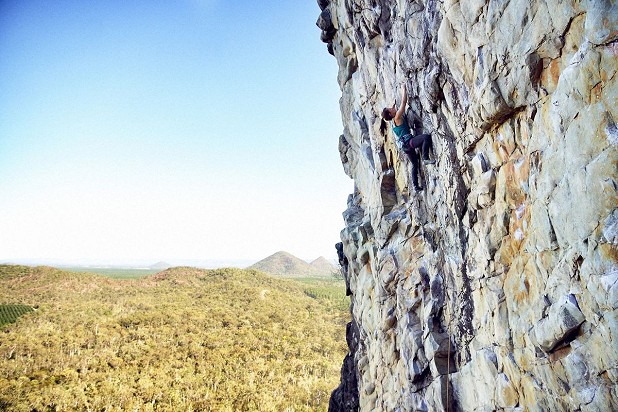
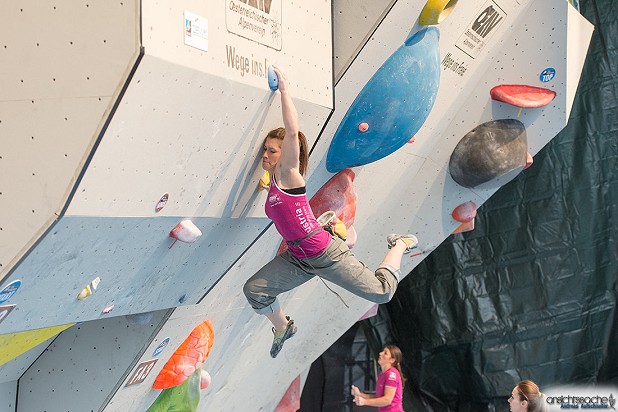
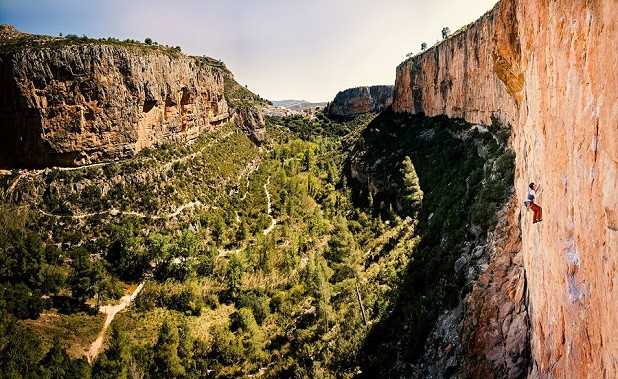
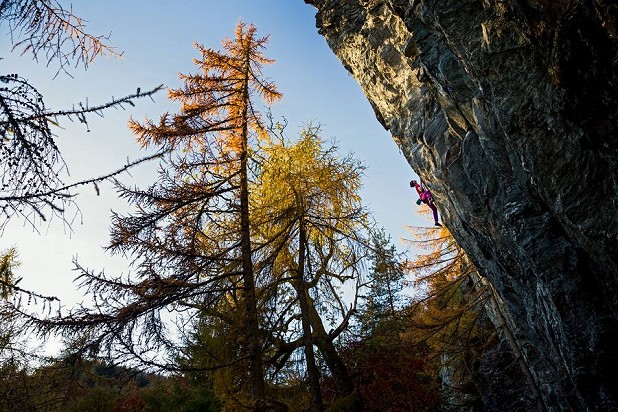
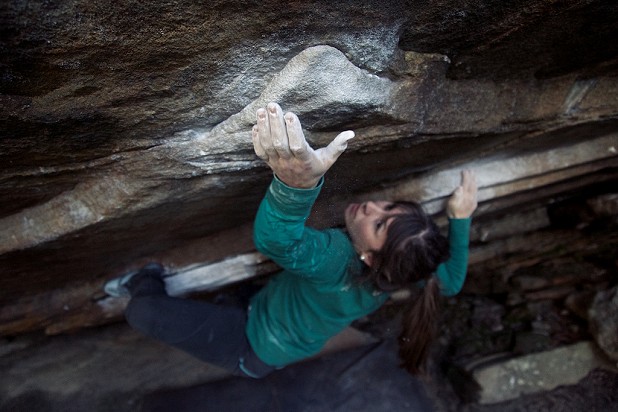
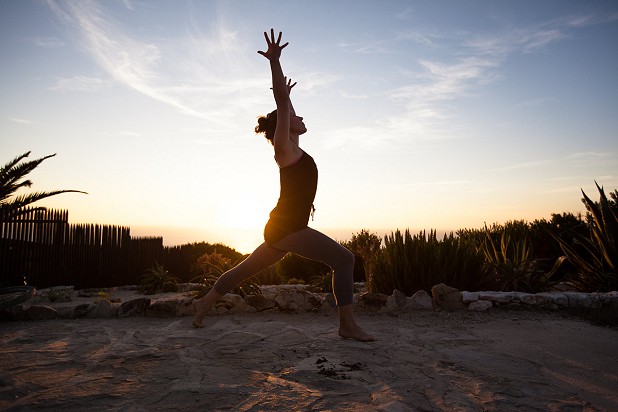

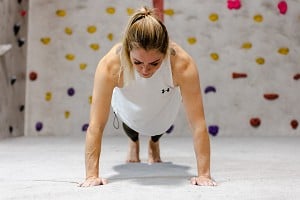
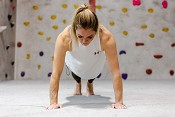










Comments